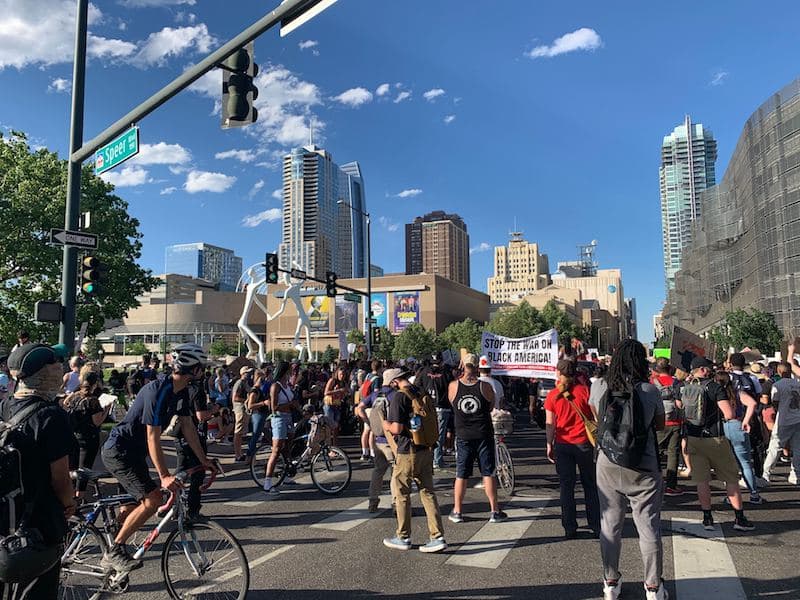A familiar scene arose Sunday afternoon in Denver: Hundreds of people had gathered near and around the State Capitol, some listening, many chatting, others taking a break after marching downtown.
It was the eleventh consecutive day of demonstrations and marches denouncing racism and police violence. The first protest was sparked by the death of George Floyd in police custody in Minneapolis. But now, nearly two weeks later, local cases involving Black men being killed by police or in police custody have started working their way into megapahones and conversations more and more.
We wondered: How is this moment different than previous marches and movements, including past demonstrations against police killings? We asked five protesters.
Renee Hurd
"To be honest, I don't see anything different," Denver resident Hurd said while riding her bike during a march organized by the Party for Socialism and Liberation. "The only difference I see is we're speaking more locally on the killings, the police brutality killings of locals here. That's the main difference here."
Hurd said there are other protests calling for unity among all lives during this moment; she noted that while she believes all lives do matter, right now she's "fighting for the fact that Black lives don't equally matter." The PSL march Hurd attended was anti-police and included chants with expletives against cops. She wants people to keep having conversations and reading literature about race, including speaking about it with friends.
"I'm hoping the momentum will continue not only us as the people, but within the justice system as well."
Ony Mgbeahurike
"I think what is happening right now is a revolution," said Broomfield resident Ony Mgbeahurike while participating in the PSL march. "It's not just a movement."
He calls it a revolution because he said people are realizing the way things in the United States have been operating is an issue for everyone, not just for Black Americans. He said he's seen white and Latino demonstrators during the protest (Sunday marked his first protest), which to him proves people no longer see police accountability as a problem that must be solved by Black people. He wants more accountability for city leaders like Mayor Hancock, improved funding for education and support for Black people in education. "
I was moved by everybody's courage. I was moved by everybody coming out. And I was moved because I wanted to add my voice to the conversation that's going on right now."

Kimberly Ming
Poet Kimberly Ming, who works as the transit equity specialist for RTD, walked down the Capitol's step after reciting a poem in front of hundreds of people on Sunday evening.
Ming said the Black Lives Matter movement has reached a global scale.
"My sister lives in Taiwan and she actually shared with me (that), 'Hey I'm going to a meeting talking about Black Lives Matter.' It's the first time in Taiwan that they're really trying to explore, like 'Wait, what's happening in the United States?'" For Ming, seeing similar demonstrations in other countries is proof the conversation has been elevated and become more widespread. Conversations about race are also surfacing in her workspace, which she said has been a surprise. People she interacts with are more willing to listen.
Belinda Polynice
CU Boulder student Belinda Polynice came to Denver for the demonstration. To her, the protests are already having an impact: She noted that there have been some bills introduced for police accountability and cops have been charged (one officer involved in George Floyd's death faces second-degree murder charges).
"We still have a long way to go. So I believe that if we keep the pressure on, we can definitely make some real change. But if we let up, it will be the same."
Polynice is a newcomer to protests. But she said it's been a positive experience so far: "I felt like I'm being loved for the first time. People love Black people for the first time. People are actually caring about what happens to us."

Anthony Ware
Denver resident Anthony Ware took part in the student-led Black Lives Matter march down Colfax. "This is meaningful because the awareness needs to stay consistent," Ware said. "To the extent that we (maintain) energy around this issue and we can keep it going, then that's what we need to do."
Accompanied by his five-year-old daughter, Aria, Ware's biggest hope is that this current moment doesn't become a phase, something he's said has happened too many times in the past. He wants the world to heal.
"This time, hopefully, it seems like it's catching on more worldwide and has some more durability. We'll see."














